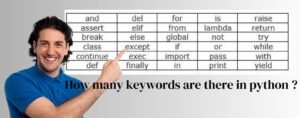
Reserved Keywords in Python | A Guide to Using Them Properly
The Reserved Keywords
If you’re new to programming in Python, you may have heard the term “reserved keywords” but aren’t quite sure what they are. In this post, we’ll provide a comprehensive guide to Python reserved keywords, explaining what they are, why they’re important, and how to use them properly.
These keywords are an important part of the Python programming language, defining its structure and syntax. By following best practices for using reserved keywords, you can ensure that your code is easy to read, understand, and maintain. We hope this tutorial will help you gain a better understanding of Python reserved keywords and how to use them properly in your code.

What Are Reserved Keywords in Python?
Reserved keywords are words that have a special meaning in Python and cannot be used as variable names or other identifiers. These keywords are reserved for specific programming purposes and have predefined functionality in the Python language. Examples of Python reserved keywords include “if,” “else,” “while,” “for,” “break,” “class,” and “def.”
LIST OF Python KEYWORDS
- Value Keywords: True, False, None.
- Operator Keywords: and, or, not, in, is.
- Control Flow Keywords: if, elif, else.
- Iteration Keywords: for, while, break, continue, else.
- Structure Keywords: def, class, with, as, pass, lambda.
- Returning Keywords: return, yield.
- Import Keywords: import, from, as.
Why Are Reserved Keywords Important?
Reserved keywords are important in Python because they help define the language’s structure and syntax. By reserving certain keywords for specific programming purposes, Python ensures that developers can write code that is easy to read and understand, making it simpler to create and maintain complex software projects.
How to Use Reserved Keywords in Python?
To use keywords in Python, you simply need to include them in your code where appropriate. For example, if you want to use a conditional statement in your code, you would use the “if” reserved keyword followed by the condition you want to test. It’s important to remember that reserved keywords cannot be used as variable names or other identifiers in your code.
Best Practices for Using Reserved Keywords
To ensure that your code is easy to read and maintain, it’s important to follow some best practices when using reserved keywords in Python. Here are a few tips to keep in mind:
- Always use these keywords according to their intended purpose.
- Never use these keywords as variable names or other identifiers.
- Choose descriptive variable names to make your code easier to understand.
- Use whitespace and indentation to make your code more readable.
Conclusion:
From the previous discussion we know that keywords in python are special types of tokens whose meanings and uses are already defined to the Python interpreter. it means if you use these words for any other purpose except for which it is defined then they will not work and give errors in your Python program.
This can be understood by the example of English dictionary. Because in In English dictionary meanings for each
Example
word is already define that means
An apple is always an apple Apple is a keyword for a specific fruit
A table is always a table Table is a keyword for a specific furniture
and
you cannot use word apple for table
and cannot use word table for apple
Now, so called definitions for keywords in python are:-
Keywords in python are special identifiers with predefined meanings that cannot be changed.
A keyword in python is a special word that has a special meaning and purpose keywords are reserved and are few in quantity .
Example
If, elif, else
That’s enough for writing answers in examinations. Now let’s finish the topic by the following table which has all useful keywords in Python programming.

Exam Time
Here are some important questions and their answers on the topic of “Python Keywords”:
Q. What are Python Keywords?
Answer: Python Keywords are reserved words that have a special meaning in the Python programming language. These words cannot be used as identifiers, such as variable names or function names, and are used to define the syntax and structure of the Python language.
Q. How many keywords are there in Python?
Answer: As of Python 3.10, there are 35 keywords in Python. Some of the commonly used keywords include “if”, “else”, “while”, “for”, “in”, “def”, “return”, “import”, and “from”.

Q. What is the difference between a keyword and an identifier in Python?
Answer: Keywords are reserved words that have a special meaning in Python, and cannot be used as identifiers such as variable names or function names. Identifiers, on the other hand, are user-defined names that represent variables, functions, classes, or modules in Python.
Q. Can Python Keywords be used as variable names or function names?
Answer: No, Python Keywords cannot be used as variable names or function names, as they are reserved for a specific purpose in the Python programming language. If you try to use a keyword as an identifier, you will get a syntax error.
Q. How are Python Keywords useful in programming?
Answer: Python Keywords are useful in programming as they define the structure and syntax of the language, making it easier to write and read Python code. By using keywords, developers can write code that is concise, clear, and easy to understand, and avoid using ambiguous or misleading names for variables and functions.
Q. What are some of the new keywords added in Python 3.10?
Answer: Python 3.10 added two new keywords: “match” and “case”. These keywords are used in the new pattern matching feature, which provides a more concise and readable way to handle conditional statements.
Q. Can keywords be imported in Python?
Answer: No, keywords cannot be imported in Python as they are part of the language syntax and cannot be overridden or redefined. If you try to import a keyword, you will get a syntax error.
Q. Are Python Keywords case-sensitive?
Answer: No, Python Keywords are not case-sensitive. For example, you can use “if”, “If”, or “IF” interchangeably in your code.
Q. Can Python Keywords be deleted?
Answer: No, Python Keywords cannot be deleted as they are an integral part of the language syntax and cannot be modified or removed. If you try to delete a keyword, you will get a syntax error.
Q. What is the purpose of the “as” keyword in Python?
Answer: The “as” keyword in Python is used for aliasing. It allows you to create an alternative name for a module, function, or class, which can make your code more readable and easier to understand. For example, you can use the “as” keyword to give a shorter or more descriptive name to a module, such as “import numpy as np”.
Q. What is the keyword for function in Python?
The keyword for defining a function in Python is “def”.
The “def” keyword is followed by the function name, a set of parentheses that may include arguments, and a colon. The body of the function is indented below the “def” statement and includes the code that defines what the function does.
Here’s an example of a simple function that takes two arguments and returns their sum:
def add_numbers(a, b):
sum = a + b
return sum
In this example, “def” is used to define the function named “add_numbers”, which takes two arguments “a” and “b”. The body of the function calculates the sum of the two numbers and returns the result using the “return” keyword.
Also Read in COMPUTER SCIENCE CLASS 12 CBSE
How to Learn Python free online
Syllabus : computer science with python
Also Read in PHYSICS CLASS 12 CBSE
Important Concepts Electrostatic Chapter 2 : Electric potential and capacitance
physics reduced syllabus class 12 cbse 2020-21
Important notes and questions Class 12 Physics : electric charge and electric field


